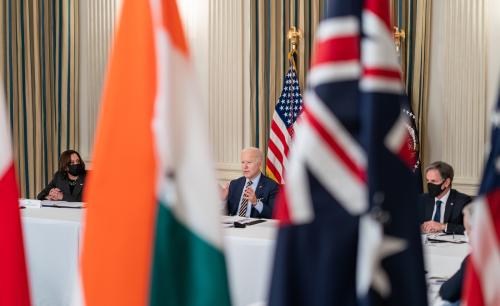In advance of the fifth meeting of the U.S.-China Strategic and Economic Dialogue next week, Brookings scholars Kenneth Lieberthal and Eswar Prasad discuss U.S.-China relations and the top agenda items both sides. Topics covered include: cybersecurity, the U.S.-China economic and investment relationship, North Korea, the Trans-Pacific Partnership, maritime issues and the South China Sea, and China’s currency and exchange rate.
Kenneth Lieberthal on North Korea:
“I think the bottom line is China has moved from giving clear priority to stability in North Korea, with denuclearization very much secondary, to a current position where they accord equal weight to denuclearization of North Korea and stability of North Korea. We of course want them to have denuclearization first and foremost. I don’t think they are there yet and I think it’s going to be hard to move them beyond their current position.”
Kenneth Lieberthal on cybersecurity:
“The U.S. in the cyber arena is trying to drawing a bright red line. Effectively, the U.S. position is everyone conducts espionage; we don’t object to Chinese espionage, they should not object to ours. But, the U.S. does not do commercial espionage to benefit our own firms competitive position, the Chinese side does and we insist that they stop.”
Eswar Prasad on the People’s Bank of China:
“Across the Pacific, the People’s Bank of China’s actions during the recent liquidity squeeze in China’s financial system have received a lot of attention. My interpretation is that the PBOC hung tough even while markets seemed to be undergoing a fair degree of turmoil with interbank rates shooting up, but it signals there is very significant support among the top leadership for financial sector and banking reforms.”
Eswar Prasad on U.S.-China investment:
“The U.S. will continue pushing for better access of U.S. corporations and financial institutions, China’s markets, and also for better intellectual property protection. China, for its part, will be eager to get more clarity from the U.S. government about Chinese firms access to investment opportunities in the U.S. as well as U.S. technology.”

Commentary
A Conversation on the U.S.-China Strategic and Economic Dialogue
July 3, 2013